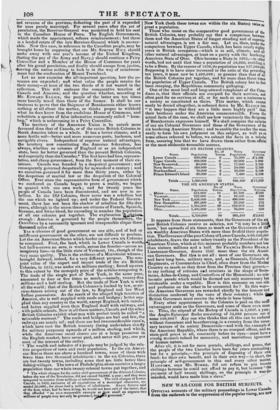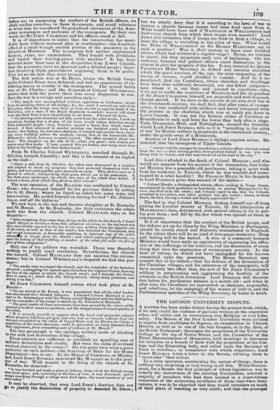- NEW WAR-CODE FOR BRITISH SUBJECTS.
OFFICIAL accounts of the military proceedings in Lower Canada, from the outbreak to the suppression of the popular rising, are new
before us: in examining the conduct of the British officers, we shall confine ourselves to those decuments, and avoid reference to what may
be considered the prejudiced statements of theAme- rican newspapers and partisans of the Insurgents. By their own words let Sir JOHN COLBORNE and his officers stand or fall. It is of importance to notice that the insurrection has mani- festly been without matured plan or combination—the desultory effort of a small though excited portion of the peasantry in the district of Montreal. The insurgents had neither experienced leaders, arms, nor ammunition. They fought with pitchforks and loaded their fowling-pieces with marbles ! It has been asserted more than once in the despatches from Lower Canada, that the peasantry were an ignorant and a deluded people; there- fore deserving slight punishment supposing them to be guilty. Now let us see how they were treated. The first action was at St. Denis, where the British troops under Colonel GORE were defeated, and had no opportunity of ex- hibiting mercy or cruelty to the insurgents. The second battle was at St. Charles ; and the despatch of Colonel WETHERALL proves that with the power there was every disposition to con- duct the war in a savage and merciless style- " The march was accomplished without opposition or hindrance, except
from the breaking down of the bridges, &c. until I waived one mile front
• this place, when the troops were fired at from the left or opposite bank of the Richelieu, and a man of the Royal Regiment wounded ; several rifle-shots were also fired from a bai II immediately in our front. / burned the barn. " On arriving at twohundied and fifty yards from the rebel works, I took up a volition, hoping that a display of my force would induce defection among these infatuated people : they, however, opened a heavy fire, which was re- turned. I then advanced to another position one hundred yards from the works; but finding the defenders obstinate, I stormed and carried them, burn- ing every building within the stockade, except that of the honourable Mr. Debartsch ; which, however, is much injured. The affair occupied about one hour. The slaughter on the side of the rebels was great": only sixteen pri- soners were then made. I have counted fifty-six bodies, and many more were killed in the buildings, and their bodies burnt."
From St. Charles Colonel WETHERALL marched through St. Olivit1re, towards Chambly; and this is his account of an exploit on the road- " About a mile from St. Oliviere, the rebels were discovered in a position well adapted to check my progress: they had protected themselves with an abattis, and two contemptible guns mounted on carts. They lied as soon as I formed to uttack ; relinquish;ng their guns, which are in my possession. A few shots were exchanged, by which two men of the rebels were killed. / burned a house from which they fired on their retreat."
The next operation of the Ro)alists was conducted by Colonel GORE; who revenged himself for his previous defeat by setting fire to St. Denis ; where he found no rebels but some arms and ammunition. He prided himself on having burned "Dr. Nelson's house, and all the defences."
We now turn to the last and decisive slaughter at St. Eustache and St. Benoit. At St. Eustache, the little resistance the rebels made was from the church. Colonel MAITLAND Says, in his despatch— "Alter remaining there some time, firing on the rebels in the church, I found myself obliged to withdraw from that advanced situation, as the regiment was then unavoidably exposed to the fire of our own artillery from the opposite side of the town, as well as that of the rebels ; but detached the Grenadier., first and secopd companies, to favourable positions, to intercept any of the rebels attempteg to escape from the church ; and which answered cjectually, as, upon the taking of that building, a number of the rebels fell under the fire of part of these companies."
Only one of his soldiers was wounded. There was therefore nothing to justify cruel retaliation. Nevertheless, the church was burned. Colonel MAITLAND does not mention this circum- stance; but in Colonel WETHERALL'S despatch we find this pas- sage— " The smoke soon enveloped the church, and the remainder of the battalion advanced ; a straggling tire opened upon them from the seigneur's house, forming one face of the square in which the church stood ; and I directed the Grena- diers to carry it ; which they did, killing several, taking many prisoners, and setting it on fire."
Sir Jours COLBORNE himself relates What took place at St. Benoit- " On our arrival at St. Benoit, it was ascertained that all the rebel leaders had abandoned their deluded followers. I directed Colonel Maitland to pro- ceed to St. Seholastique with the Thirty-second Regiment and two field-pieces, and the remainder of the troops to march by St. Eustache to Montreal. " The good results of these movements have been proved by the return of the peasantry to their usual occupations, and the disappearance of armed parties of the rebels.
" It is scarcely possible to suppose that the loyal and peaceable subjects whose property had been pillaged, and who had NO recently suffered front the outrages committed by the rebels of Grand Brule and the Riviere du Chene, a population of the worst character, could be prevented, on being liberated front their oppressors, from committing acts of violence at St. Benoit."
The last paragraph is the careless, military mode of alluding to the sack and destruction of the village.
These extracts are sufficient to establish an appalling case of military devastation and cruelty. But were the rules of civilized warfare observed by the victors ? Oct this point hear what a great authority on such matters—the Secretary of State for the Home Department—has to say. It, the House of Commons, on Monday last, Lord JOHN RUSSELL instructed Mr. WAKLEY as to the prac- tice of war. With respect to the firing of the church at St. Eustache, be observed— "It was fortified and made a place of defence, from which the British troops were Seed upon ; and, according to the laws of war, it was destroyed; and if troupe marching through a village were fired upon, the usual measures of war
Were taken."
It may be observed, that even Lord JOHN'S doctrine does not So to justify the destruction of property in deserted St. Denis; but we utterly deny that it is according to the laws of war to destroy a church because troops had been fired upon from it. What would have been said if NAPOLEON or WELLINGTON had fired every church from which their troops were assailed ? Lord JOHN also intimates, that if troops are fired on from a village, to burn the village is according to the rules of war. What would the Duke of WELLINGTON Or Sir HENRY HARDINGE say to such a practice? Was it their custom to burn even fortified Places, which had withstood a regular siege? Never, we venture to assert, did they perpetrate such acts of barbarism. On the contrary, humane and gallant officers exert themselves to the utmost to save the property of the foe. It was reserved for Queen VICTORIA'S Horne Secretary to defend and sanction atrocities which the great warriors of the age, the most unsparing of the means of success, would shudder to commit. And be it re- membered, that the Canadians, whose churches and dwellings have been thus ruthlessly devastated, are our fellow subjects— men whom it is our duty and interest to conciliate—who, if we are to credit the assertions of Ministers and the despatches of Sir JOHN COLBORNE himself, are peaceable and well-disposed, though misled. If we turn to the records of our own civil war in the seventeenth century, we shall find, that after years of exaspe- ration, it was conducted with mildness and mercy compared with the practice in the ebullition which was so easily put down in Lower Canada. It was not the fashion either of Cavaliers or Roundheads to sack and burn the towns they took after a siege. York, Gloucester, Hull, and Nottingham, escaped the brutality which Lord JOHN RUSSELL tells us it is "according to the rules of war" for British soldiers to perpetrate in the nineteenth century, .
under the gentle sway of a Brunswick. _-
Another of Lord JOHN RUSSELL'S sliyings requires notice. He asserted, that the insurgents of Upper Canada . . . commenced the outrages by murdering a military officer who had retired from the serv Ice after having greatly distinguished himself in war, who was living with his family, and who was murdered on his road to the city."
Lord JouN alluded to the death of Colonel MOODIE; and who would not suppose from his account of the transaction, that Colo- nel Moonlit was a peaceable old gentleman, taking a quiet walk from his residence to Toronto, where be was waylaid and assas- sinated by a rebel banditti? Sir FRANCIS HEAD, in his despatch to Lord GLENELG gives this account of the matter- " Colonel Moodie, a distinguished veteran officer, residing in Yonge Street, accompanied by three gentlemen on horseback, on passing Montgomerie's Ta- vern, was fired at by the rebels ; and I deeply regret to say, that the Colonel, wounded in two places, was taken prisoner Into she tavern ; where, in three hours, he died, leaving a widow and family unprovided for."
The fact is, that Colonel MOODIE, finding himself cut off from joining the Loyalist muster at Toronto, by the interposition of MACKENZIE'S men, determined, with several others, to try to gal- lop past them ; and fell by the fire which was opened on them in consequence. It is of importance that the conduct of the British troops, and the defence set up for them by the Whig Ministers in Parliament, should be clearly stated and distinctly remembered in England. In the colony there will be no need of newspaper mementos. Deep and lasting will be the hatred. A wise or a commonly humane Minister would have made an opportunity of expressing his afflic- tion at the sufferings of the colonists, and his detestation of every thing that bore the appearance of unnecessary severity. In the hour of victory, he would not have apologised for the horrors committed upon the prostrate. The Home Secretary may commit this to Isis tablets—that his defence of the devastation of the Canadian villages, and his calumnies of the insurgents, will have scarcely less effect than the acts of Sir JOHN COLBORNE'S soldiery in perpetuating and aggravating the hostility of the colonists to the British connexion. Lord DURHAM will discover this before his pacificatory mission is a month old : and when in after time the Canadians are reproached as obstinate, ungrateful, and rebellious, let the campaign of the winter of 1837-8, and the Parliamentary speeches of the Whig Secretary, be borne in mind.



























 Previous page
Previous page